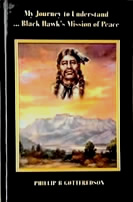by Phillip B Gottfredson, Indigenous Day Award recipient.
The militia, officially called the Nauvoo Legion, was composed of southern Utah's Mormon settlers (members of The Church of Jesus Christ of Latter-day Saints, or the LDS Church). Intending to leave no witnesses and thus prevent reprisals, the perpetrators killed all the adults and older children—about 120 men, women, and children in total. Seventeen children, all younger than seven, were spared. Source: From Wikipedia 2007.
The company included about 140 men, women and children—the women and children outnumbered the able-bodied men 2-to-1. As daylight broke in the remote Utah Territory valley, a volley of gunfire and a shower of arrows ripped into the wagon camp from nearby ravines and hilltops, immediately killing or wounding about a quarter of the adult males. Source: Historian Will Bagley 2007.
The Church of Jesus Christ of Latter-day Saints finally said "yes" to their involvement in the Mountain Meadows Massacre in 1857. In a recent article in the Church's Ensign magazine, 2007, church historian Richard E. Turley gives what is said to be the Church's official account of the Massacre.
While Turley denies that Brigham Young had anything to do with the murders and that some "saints" acted independently, I applaud the Church for finally acknowledging and addressing this horrible event. My lingering respect for the Church has been, to some degree, reinforced. However, I am very disappointed by Turley's blatant disrespect for the Paiute in his article. Again as with so many church authors, Turley stands arrogantly pointing the finger of guilt, damning the Paiute without respect or compassion toward them. True to form, the Church then bashes the Utah Indigenous. Turley or the Church could have asked the Paiutes their side of the story. Still, instead, Turley's obvious biased opinion is proof and sufficient to show the Church's duplicity toward Native people.
Mr. Turley goes to great lengths to distance the Church from John D. Lee and the other members who were renegade Mormons. He also suggests that there were good and bad people in the Church. The Massacre at Mountain Meadows was an unfortunate but isolated incident. We should not blame the Church for the mistakes of a few. Hypocritically, he does not apply the same compassion when he unofficially speaks on behalf of the Paiute, makes broad assumptions, and presents his case as gospel truth without making any allowance that they may have their opinion different from his. Are we all equal in the eyes of the Creator, or just some?
As Michael Quinn said in 1981 when he spoke to an assembly of Church members, "The Accommodation History advocated by Elders Benson and Packer and practiced by some LDS writers is intended to protect the Saints, but disillusions them and makes them vulnerable... The tragic reality is that there have been occasions when Church leaders, teachers, and writers have not told the truth they knew about difficulties of the Mormon past but have offered to the Saints instead a mixture of platitudes, half-truths, omissions, and plausible denials..."
I agree with Michael Quinn and stand firm in my conviction that believing in these contrived, sugarcoated stories of innocence contributes to the acculturation of a culture that is blind to the truth.
"Richard E. Turley Jr., "The Mountain Meadows Massacre," Ensign, Sep 2007, 14–21 For a century and a half, the Mountain Meadows Massacre has shocked and distressed those who have learned of it. The tragedy has deeply grieved the victims' relatives, burdened the perpetrators' descendants and Church members generally with sorrow and feelings of collective guilt, unleashed criticism on the Church, and raised painful, difficult questions. How could this have happened? How could members of the Church have participated in such a crime?
Two facts make the case even more difficult for me to fathom. First, nothing that any of the emigrants purportedly did or said, even if all of it were true, came close to justifying the cold-blooded murder of 120 men, women, and children. Second, it is said that most perpetrators led decent lives, nonviolent lives before and after the Massacre, and that makes a difference. How?
